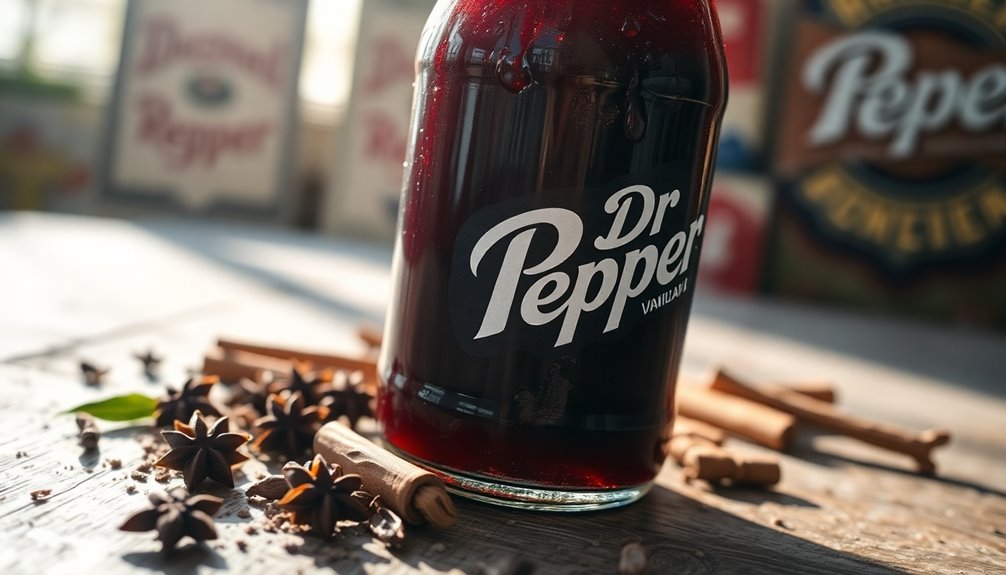Before medical procedures, knowing what beverages are safe is vital. You can have clear liquids, like water, clear fruit juices, black coffee, and tea, up to two hours prior. Avoid solid foods for at least eight hours before surgery. Non-clear drinks, such as milk or coffee with cream, should be left alone six hours ahead. Don’t forget to skip alcohol for eight hours to minimize risks. Sticking to these guidelines helps guarantee a smoother surgical experience and reduces the chances of complications. By exploring more, you’ll uncover the details specific to your situation and other essential guidelines.
Key Takeaways
- Clear liquids like water, apple juice, and black coffee are generally safe up to 2 hours before surgery.
- Avoid solid foods for at least 8 hours and non-clear liquids, such as milk, for 6 hours prior to procedures.
- Alcohol consumption should stop at least 8 hours before surgery to minimize health risks.
- Chewing gum and hard candy are allowed if not swallowed, but fasting guidelines must still be followed.
- Special cases, like emergencies, may adjust fasting requirements based on individual health circumstances.
Importance of Preoperative Fasting
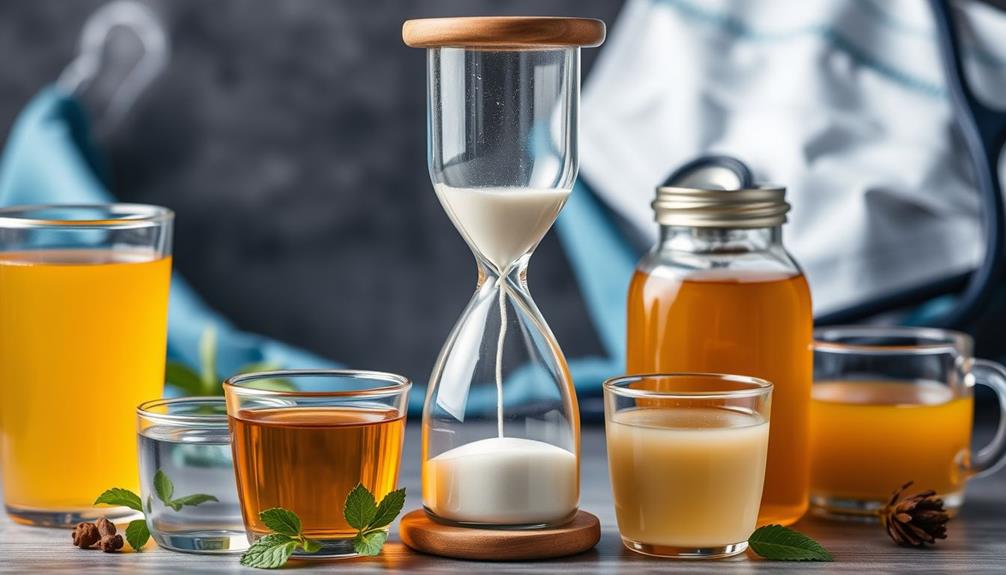
Preoperative fasting is essential for your safety during medical procedures. It helps guarantee your stomach is empty, considerably reducing the risk of aspiration during anesthesia and surgery. This precaution is critical because aspiration can lead to serious complications, including brain damage or even death.
Additionally, it’s important to be aware of any specific health risks you may have, such as a history of breast cancer, which can influence your preoperative care and fasting guidelines. For those interested, mammography guidelines provide important insights into early detection strategies that may impact your overall health.
For adults and teenagers aged 12 and older, you’ll need to avoid solid foods for at least 8 hours before your surgery. Additionally, it’s important to refrain from consuming clear liquids for 2 hours prior to your arrival at the medical facility.
If you’re caring for children aged 3 to 12, they can have solid foods and dairy until 8 hours before the procedure, but clear liquids should be maintained until 2 hours before. Infants under 6 months can have formula or breast milk up to 4 hours before surgery, with clear liquids allowed until 2 hours prior.
Following the specific fasting guidelines provided by your healthcare professionals is essential. Every individual and procedure may have different requirements, and adhering to these instructions guarantees your safety and helps facilitate a smoother surgical experience.
Guidelines for Adults and Teenagers
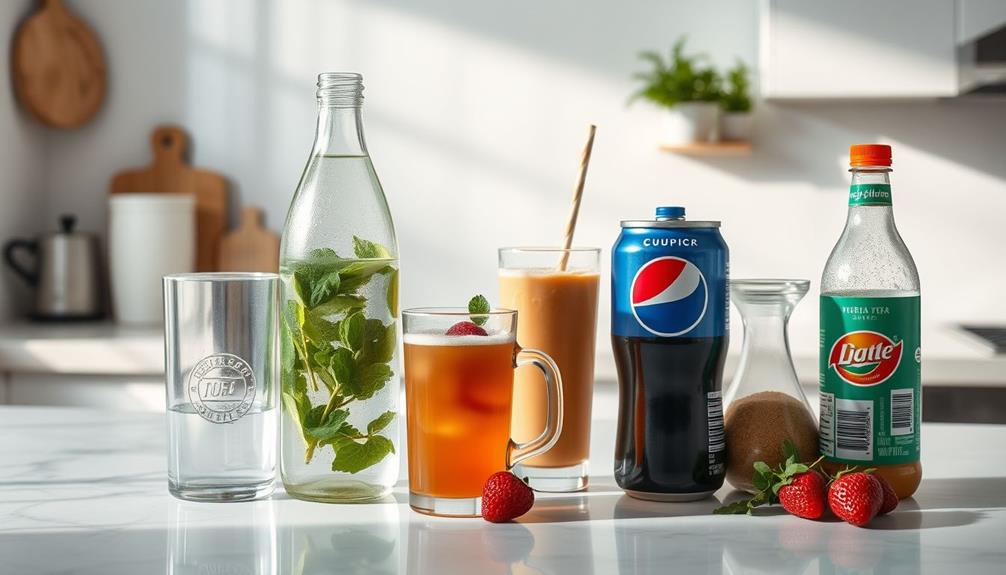
When you’re preparing for surgery, it’s important to know the fasting guidelines. You can eat solid foods until 8 hours before your procedure, but keep in mind that clear liquids are only allowed up to 2 hours prior.
Following these recommendations helps reduce the risk of complications during your surgery. Additionally, staying hydrated with clear liquids can aid in recovery, as proper hydration is essential for overall health importance of hydration.
Fasting Duration Recommendations
Before your medical procedure, it’s important to follow specific fasting guidelines to confirm your safety and the best possible outcome. Adhering to these recommendations will help confirm your stomach is empty, minimizing risks during the surgery.
Additionally, understanding the importance of financial considerations, such as potential costs for any required post-operative care, can alleviate stress during this time financial considerations for elderly care.
Here are the fasting duration recommendations for adults and teenagers (12 years and older):
- Solid Foods: Avoid solid foods for at least 8 hours before your procedure. This confirms an empty stomach.
- Clear Liquids: You can drink clear liquids up to 2 hours prior to your arrival. Options include water, clear juices, and tea.
- Non-Clear Fluids: Refrain from non-clear fluids, like milk and coffee with cream, for at least 6 hours beforehand to prevent complications.
- Alcohol: Avoid alcohol consumption within 8 hours of surgery to minimize risks during the procedure.
Following these fasting guidelines won’t only promote your safety but also contribute to better surgical outcomes.
Acceptable Clear Liquids
A variety of clear liquids are acceptable for consumption in the hours leading up to your medical procedure. You can safely drink water, clear fruit juices (just avoid those with red coloring), black coffee, and clear tea up to 2 hours before your appointment.
These clear fluids are crucial because they’re transparent and free from pulp or cloudiness, minimizing the risk of aspiration during anesthesia. Additionally, staying hydrated can support overall well-being, including essential oils for respiratory health which may help ease any pre-procedure anxiety.
However, remember that alcohol is off-limits for at least 8 hours before your procedure. Stick to non-alcoholic options.
Avoid non-clear fluids, like milk or coffee with cream, for at least 6 hours prior; they can increase the risk of complications.
Always pay attention to the specific guidelines from your healthcare provider, as they may differ based on your individual situation or the type of procedure you’re undergoing.
Following these recommendations guarantees that your body is prepared and reduces the likelihood of complications during anesthesia. By sticking to these clear liquid guidelines, you help guarantee a smoother experience during your medical procedure.
Guidelines for Children

When it comes to preparing your child for surgery, understanding fasting durations is essential.
It’s important to recognize that children may experience heightened anxiety or emotional distress leading up to medical procedures, which can be similar to the intense feelings seen in individuals with Borderline Personality Disorder (BPD).
You’ll want to guarantee they’ve clear liquid options available until just before the procedure while avoiding non-clear fluids well in advance.
Always check for any specific instructions from your child’s surgeon to keep everything on track.
Fasting Duration Recommendations
Typically, fasting guidelines for children vary by age and are vital for their safety during medical procedures. Understanding the impact of various factors on development, such as the importance of critical periods identified for skill acquisition, can help caregivers make informed decisions.
You’ll want to guarantee your child follows these recommendations to minimize the risk of complications during anesthesia.
Here’s a quick breakdown of fasting duration for children:
- Children aged 3 to 12 years: They can eat solid foods and dairy until 8 hours before surgery, but clear liquids are encouraged up to 2 hours prior.
- Children under 3 years: They should also eat solid foods and dairy until 8 hours before, but milk, formula, or breast milk is allowed until 6 hours before the procedure. Clear liquids follow until 2 hours prior.
- Hydration: It’s essential to keep your child hydrated, especially in warm weather. This helps prevent dehydration leading up to surgery.
- Follow surgeon instructions: Always stick to the specific guidelines provided by your child’s surgeon, as they may have particular requirements.
Clear Liquid Options
After confirming your child adheres to the fasting guidelines, it’s important to know which clear liquid options are suitable. For children aged 3 to 12 years, you can offer clear liquids up until 2 hours before the procedure. This includes water, clear juices like apple juice, and electrolyte drinks. These options help keep your child hydrated, which is vital, particularly in warm weather, to prevent dehydration complications.
Additionally, it’s wise to set specific hydration goals, similar to how one would establish savings goals for financial health, to guarantee your child consumes enough fluids.
When choosing clear liquids, remember to exclude any that appear hazy or contain pulp, fats, or alcohol. Clear liquids should be easily visible through, confirming they comply with preoperative guidelines. In addition to apple juice, you can also consider white grape juice or other similar clear options.
It’s essential to monitor your child’s hydration levels and encourage them to drink enough liquid leading up to the procedure. Always follow any additional specific instructions from your child’s surgeon regarding dietary restrictions or allowed liquids.
Special Instructions Importance
Special instructions from your child’s surgeon are vital for guaranteeing a smooth surgical experience. When it comes to your child’s diet before surgery, it’s essential to adhere to these guidelines to enhance safety and improve outcomes. Here are four important points to remember:
- Solid Foods and Dairy: Children aged 3 to 12 can have solid foods and dairy up to 8 hours before surgery. This is particularly important as it helps in managing the child’s overall well-being, similar to how financial considerations in divorce can impact emotional stability.
- Clear Liquids: Encourage clear liquids like water, clear juices, and electrolyte drinks until 2 hours before the procedure. This helps maintain hydration, especially in warm weather.
- Fasting Instructions: Always follow any specific fasting instructions given by the surgeon. This is important to follow for your child’s safety and to minimize risks during surgery.
- Hydration Emphasis: Make hydration a priority before surgery to prevent dehydration, particularly if your child is ill or it’s hot outside.
Following these instructions not only guarantees your child’s safety but also contributes to better surgical outcomes by reducing the risk of aspiration and other complications.
Your diligence in adhering to these guidelines can make a significant difference in the surgical experience.
Guidelines for Babies and Toddlers
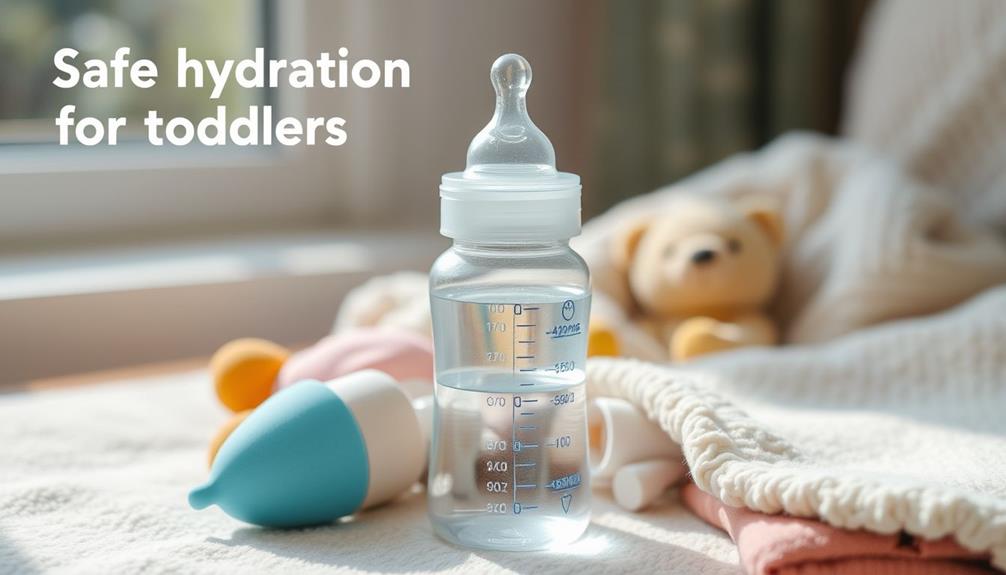
When preparing your baby or toddler for a medical procedure, it’s important to follow specific guidelines to guarantee their safety and comfort. For children aged 6 months to 3 years, you can allow solid foods until 8 hours before the procedure. This makes sure their stomachs are empty, reducing risks during anesthesia.
Maintaining a proper diet is essential for their overall health, similar to how proper care is significant for pets like hamsters, which requires attention to their diet and environment ultimate hamster care guide.
Milk, formula, or breast milk is acceptable until 6 hours prior. These options provide essential nutrients and hydration, which are crucial for your child’s well-being.
Clear liquids, like water and apple juice, can be given until 2 hours before the procedure. This helps maintain hydration without increasing the risk of aspiration.
Always adhere to the specific preoperative instructions provided by your child’s surgeon, as they may have tailored guidelines based on your child’s unique health needs.
Remember, hydration is especially important in warm weather, as babies and toddlers are more susceptible to dehydration. Keeping your little one well-hydrated will help them feel better throughout the process.
Guidelines for Infants

Preparing an infant for a medical procedure involves specific fasting guidelines to guarantee their safety.
It’s crucial to adhere to these rules, especially regarding clear liquids. Understanding the importance of caffeine content in espresso can also highlight the significance of mindful beverage choices, even for young children.
Here’s what you need to keep in mind:
- Infants under 6 months: You can give formula or breast milk until 4 hours before the procedure. Clear liquids are encouraged up to 2 hours prior.
- Infants aged 6 months to 3 years: Solid foods should be avoided for 8 hours before surgery, while milk or formula is permitted until 6 hours prior.
- Hydration: Make sure your infant stays hydrated, especially in warm weather. Clear liquids like water, apple juice, and Pedialyte are highly recommended before the procedure.
- Follow instructions: Always comply with any additional fasting instructions from your infant’s surgeon to enhance safety during the procedure.
Clear Liquid Diet Overview
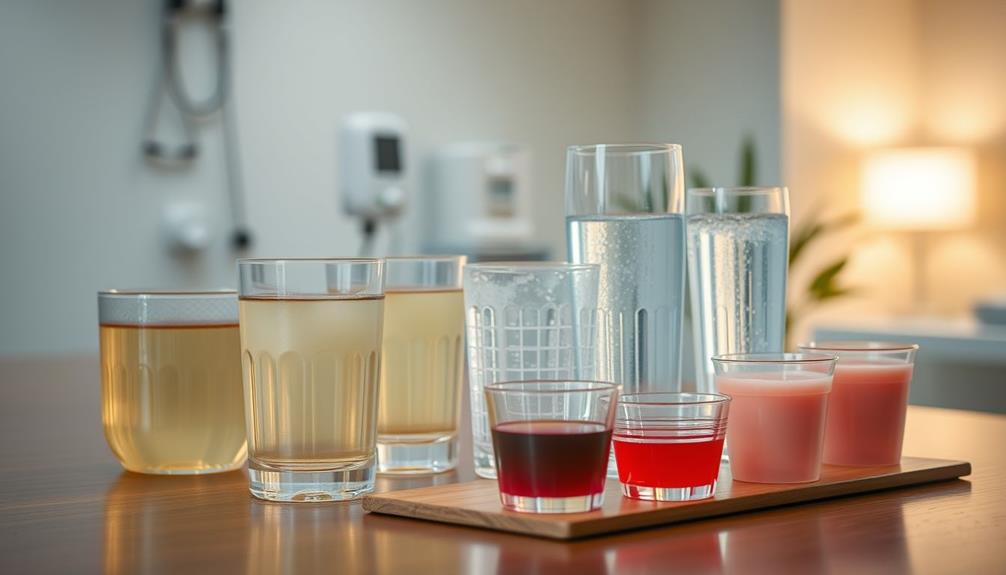
A clear liquid diet is important before certain medical tests, procedures, or surgeries to confirm your stomach is empty and reduce the risk of aspiration during anesthesia. This diet helps guarantee you’re properly hydrated while minimizing any residue in your gastrointestinal tract.
Acceptable clear liquids include water, apple juice, clear broths, black coffee, and tea. However, avoid liquids with red coloring, especially before tests like colonoscopies. It’s important to follow your doctor’s instructions and guidelines for preparing for medical tests, as certain liquids can interfere with the results. In addition to avoiding red-colored liquids, it’s also best to stay away from alcoholic beverages and any drinks with pulp or chunks. When shopping for clear liquids, be sure to check the labels of different rooibos tea brands to ensure they do not contain any red coloring or additives. Always consult with your healthcare provider if you have any questions or concerns about which clear liquids are safe for you to consume before a medical procedure.
Typically, you’ll follow a clear liquid diet for a short duration, usually no longer than 3 to 4 days. It’s vital to monitor your intake under the guidance of a healthcare professional, as individual needs can vary. This diet isn’t meant for long-term use; it’s specifically designed to provide hydration and important nutrients without leaving any solid waste.
If you’re a patient undergoing a procedure, be sure to follow your healthcare provider’s specific instructions regarding what you can and can’t consume. These guidelines might differ based on your unique medical situation and the procedure being performed, so it’s important to adhere closely to their recommendations for the best outcomes.
Aspiration Risks and Consequences
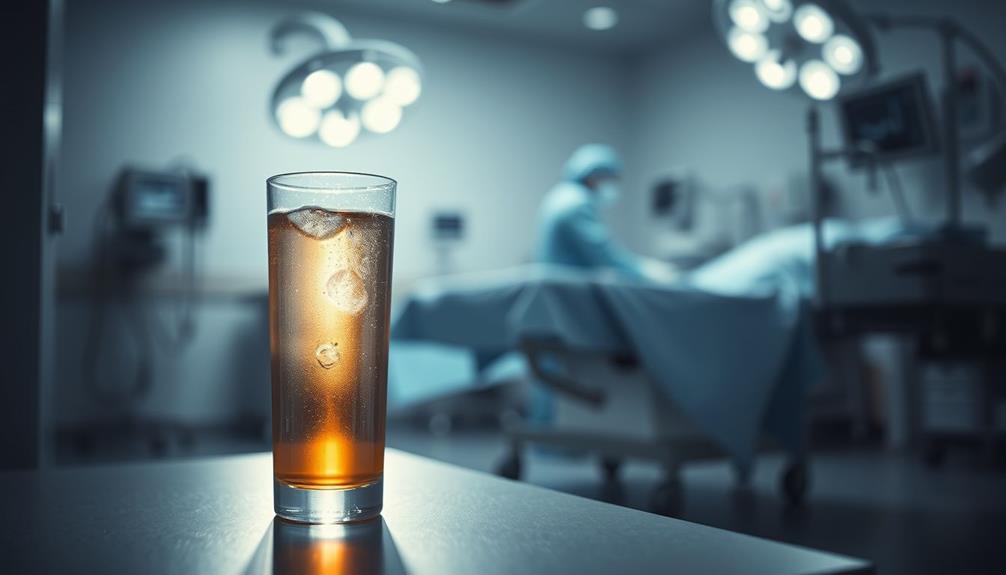
Aspiration poses significant risks during medical procedures, particularly when it involves anesthesia. When you consume food or liquids too close to surgery, you increase the chances of those materials entering your lungs instead of your stomach. This can lead to serious respiratory complications, especially during procedures like colorectal surgery.
Here are some key aspiration risks to be aware of:
- Airway Obstruction: Solid or semi-solid food can block your airway, making it difficult for you to breathe during anesthesia.
- Chemical Pneumonia: Aspiration of acidic liquids can damage lung tissue, impairing respiratory function and causing long-term issues.
- Intensive Care Admission: Treatment for aspiration may require extensive medical intervention, leading to a longer hospital stay.
- Long-Term Respiratory Problems: Even if you survive an aspiration event, you might face ongoing respiratory complications.
The importance of adhering to fasting guidelines before surgery can’t be overstated. Ignoring these guidelines can put your health at risk and complicate your recovery process.
Always consult with your medical team to understand the best practices for your safety.
Chewing Gum and Tobacco Guidelines

Chewing gum and using tobacco can raise questions about their impact on medical procedures.
When it comes to chewing gum, you can safely enjoy it or suck on hard candy without delaying your procedure, as long as you don’t swallow them. However, if you do swallow gum or candy, it’s treated like a meal, meaning you’ll need to adhere to an 8-hour fasting period before surgery.
On the other hand, chewing tobacco or using snuff is a different story. It’s important to discontinue these habits at least 6 hours prior to your procedure to guarantee your safety.
While gum and candy can be consumed, they shouldn’t replace the fasting requirements set by healthcare providers.
To avoid complications during your medical procedures, clear communication with your healthcare providers about any chewing habits is vital. They can provide personalized guidance based on your specific situation.
Special Cases and Adaptations
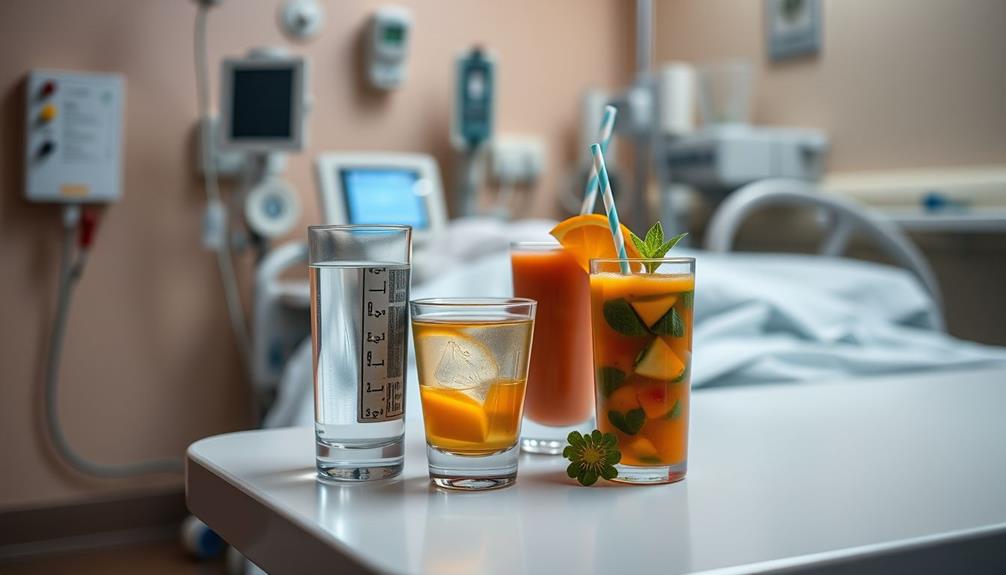
Certain situations may require flexibility in fasting guidelines before medical procedures. For instance, if you’re facing an emergency surgery, you mightn’t need to fast for the full 8 hours, depending on the urgency and your condition. An anesthesiologist can also tailor the anesthesia type to reduce aspiration risks based on your individual circumstances.
Here are some considerations for special cases:
- Enteral or Nasogastric Feeds: Stop feeding 8 hours before surgery, or 4 hours if your residual volumes are stable.
- Continuous Duodenal Feeds: These have a lower aspiration risk compared to gastric feeds, allowing for more leniency in fasting requirements.
- Urgent Procedures: Your medical team may decide that it’s safe to proceed with less fasting time if the situation demands it.
- Nutritional Support: If you’re on a specific diet without certain foods, discuss with your provider how to best manage your nutritional needs while adhering to fasting guidelines.
Always communicate with your healthcare team to guarantee you’re following the safest protocol tailored to your unique case.
Frequently Asked Questions
What Can You Drink Before a Procedure?
Imagine sipping invigorating water or black coffee, feeling energized. Before your procedure, you can drink clear liquids like tea or apple juice, but steer clear of anything creamy or pulpy for safety’s sake.
What Not to Eat 3 Days Before Surgery?
Three days before surgery, avoid high-fat foods, high-fiber items, sugary snacks, alcohol, and caffeine. These can complicate digestion, increase nausea, and affect anesthesia, making your procedure and recovery more challenging than necessary.
What Is Considered Clear Liquids Before a Medical Procedure?
Before a medical procedure, you can drink clear liquids like water, clear juices, black coffee, and tea. Just avoid anything with pulp, fat, or red coloring, and follow your doctor’s instructions for the best results.
What Should I Eat Before a Medical Procedure?
Before a medical procedure, you should avoid solid foods for at least 8 hours. Stick to clear liquids like water or apple juice up to 2 hours before, and follow your healthcare provider’s specific instructions.
Conclusion
In conclusion, understanding beverage guidelines before medical procedures is essential for your safety and recovery. Did you know that nearly 40% of patients experience complications related to aspiration? By following the outlined fasting protocols for various age groups, you can greatly reduce these risks. Whether you’re an adult or caring for a child, being informed helps guarantee a smoother experience. So, stick to clear liquids as advised, and you’ll be on the right track for your procedure.


